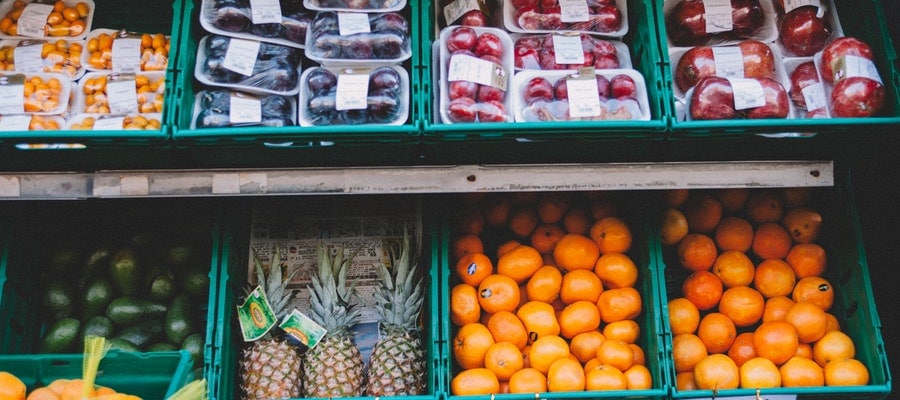
A good entrepreneur always sees a business opportunity in anything. Knowing where to tap is a key skill. India has one of the largest agricultural markets in the world and fruits are a primary product. If you can think above the local ‘mandis’ and start to see a fruit retail enterprise to cater to the new-age health conscious demand for fresh fruits, you are looking at a successful business venture.
Here are a few pointers on how to start a fruit retail business in India.
What to Sell:

First things first, decide on what to sell. The fruit category may seem small when you are looking from a buyer’s perspective, but once you are behind the counter, you need to shortlist your fruit variety as per your supply availability and local demand. You can always have the basic fruit basket of apples, bananas, and oranges, but you can also consider few exotic fruits like kiwis and mulberries.
The most important thing before you delve into the business is to gather substantial knowledge about fruits—how they are grown, shelf life, seasonal details, ripening periods, and how to identify freshness.
How to Manage your Supplies:

Supply is the primary concern for a fruit business, you need to select a reliable source to provide you good quality and fresh produce. If you plan to sell exotic fruits which are not grown locally, you need a supplier for imported fruits.
Nowadays, young entrepreneurs are aiming at linking the farmers directly to the consumers. You can tie up with certain farming organizations based in rural outskirts and get fruits from them to sell in your shop.
This way, you have a direct source of knowledge of where your fruits are being produced. There is a lot of awareness among consumers regarding organic farming, and people do not want chemical and synthetic pesticide involvement. You can sell naturally grown fruits from organic farms to cater to this demand.
Also Read: How to Start a Flower Shop Business: Complete Business Plan
Where to Open Shop:

Location is a key factor for any business. You need to select an area with high visibility and a fair amount of footfall. Fruits are a daily grocery item in all households. Hence, locating yourself near a residential area would be advantageous for you.
The physical premise of your shop also needs to be looked into. Check the layout of the place, you do not need a very big and fancy store but a large enough space with good accessibility and movement for your customers.
Also, your shop should have ample parking space available nearby as most potential customers would prefer to go Sunday shopping in their vehicles.
Why You Need Market Research:

Before you start your business, understanding your market is crucial. Figure out who your local competition is and what they are selling. Grocery shops and supermarkets sell fruit as well but their turnovers aren’t from selling fruits and vegetables only.
Opening a specialty shop consisting only of fruits gives you an edge over these retailers. Try and find your target market, if you provide organically grown fruits, you have a considerably new market to penetrate.
Also Read : How to start organic farming business
How to Setup:

You will need several things to set up your shop. Items such as shelves, shopping baskets, containers, label cards, weighing machine, and POS machines, refrigerators for storage, and also trucks for delivery and distribution. Plan your budget carefully by factoring these things in your fruits store start-up cost.
You need to set up shop with shelves in strategic positions, all items should be on display so that customers are at ease in finding fruits of their choice. They wouldn’t have to depend on you or your store manager.
Also, think of security issues and install CCTV cameras to prevent theft if your shop is fairly large and not visible from all points.
Why You Need a Business Plan:

You need capital for any sort of business. Without proper funding, a business cannot be launched. Create a fruits store business plan at the very onset of your venture. Your business plan should have the following:
- Business details such as your business objectives and missions
- Ownership pattern
- Detailed list of the fruits you wish to sell
- Set-up costs involved which should include all the equipment bought for the business
- Employee structure
- A marketing plan with the considerable market analysis done
This plan can be presented to investors and for application to banks for loans. This also acts as your guidebook in running the business, managing your costs, and acting upon the set marketing strategies.
Also Read: 15 Best Manufacturing Business
What Licenses and Permits are Required:

After officially registering your shop, get all the applicable fruits store business licenses to start your retail business. In India, legal hurdles have often proved to be hiccups for any business. Consult a lawyer to know exactly which licenses for shop and establishment purposes or trade permits are required. For small-scale retailers, a basic FSSAI (Food Safety and Standards Authority of India) license needs to be obtained.
Where to Distribute:

Owning only a physical shop might not get you your desired profit margins. In today’s digital age, retail has a new meaning. Most people get their grocery shopping done sitting in the comfort of their homes. You can open an online business, delivering right to your client’s doorsteps. However, that would involve a fairly large logistic cost.
In that case, you can supply to other e-commerce entities or large supermarket brands. You can also create a niche by having a portable shop selling right out of your truck and reaching a larger customer base.
Whom to Hire:

You cannot run a business entirely on your own, being an entrepreneur you need to have efficient managerial skills. You need to hire people who would work for you. Sales assistants who are trained in customer service and having a fair knowledge about fruits, delivery people who are in charge of transportation of your supply and distribution, and also a store manager to oversee smooth operations.
Also Read : 15 Profitable and Super-Easy Retail Business Start-up Ideas
Managing your Stock:

Unlike other retail commodities, fruits have one glaring concern —they are perishable items. You should have efficient inventory management skills. Get supply as per daily demand, make sure fruits like bananas do not spill over too many business days.
Even if you have a good storage facility, certain fruits are essential to be consumed fresh. Try to minimize your daily waste by planning your stock movement wisely. Make sure your fruits are not damaged in transit while getting them from the supplier or distributing to vendors or customers. Providing fresh fruit to customers should be your primary business objective.
How to Set your Prices:

In agricultural markets, there is less scope in setting profitable prices. The markets are adjusted by demand-supply movements and the prices are fixed at equilibrium levels, leaving very less surplus to sellers. While setting your prices, think of factors which give you an edge over mass sellers like supermarkets. They offer low prices for bulk purchase, you, on the other hand, are a specialist in fruit selling and capable to offer a wide variety to customers.
Also, with the advent of organic farming, organically produced fruits can be considered a premium product and hence, can be charged higher than regular fruits.
How to Promote your Brand
Advertising is a must for businesses, especially for new ones. You need to effectively promote your venture to obtain maximum reach. The essential element that should be reflected in your marketing strategy is to establish your niche and unique selling points. The following are a few things to keep in mind while forming your marketing plans.
- Keep your brand name catchy and attractive with a suitable logo.
- Make sure you store is visually appealing and neat for customers to shop with ease.
- Set up stalls in food fairs giving out information about your store.
- Open a website for your online business with good navigation and customer support.
- Be active on social media to promote your online business.
- Give out discounts in your first week of operations.
- Publish informative content educating your customers about the fruits and their ways of production.
- Distribute pamphlets and flyers to people visiting the nearby malls.
- Let your customers know about the benefits of organically produced fruits. This should get their attention as they become more aware of the harms of synthetic produce.
Conclusion:
The fruit retail industry in India is a high growth sector. India holds a fairly large share of agricultural production for fruits and vegetables in the world such as 32.6 percent for bananas and 22.1 percent for mangoes. This indicates a large scope of foreign demand as well.
Being a fruit retailer in a country like India, brings about heavy prospects, however, like any other small scale business, competition is high and needs proper planning and an effective marketing strategy to build your enterprise.
You need to concentrate on inventory management and customer service skills but the primary thing to focus on is the quality of fruits provided. Good quality holds the key to your brand reputation and expansion of your business.
Video Link: Safal Case Study